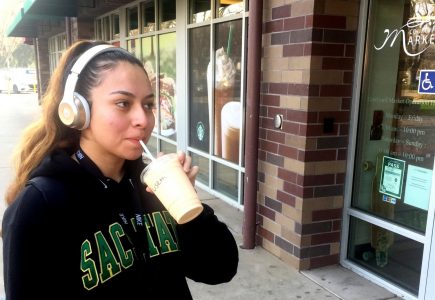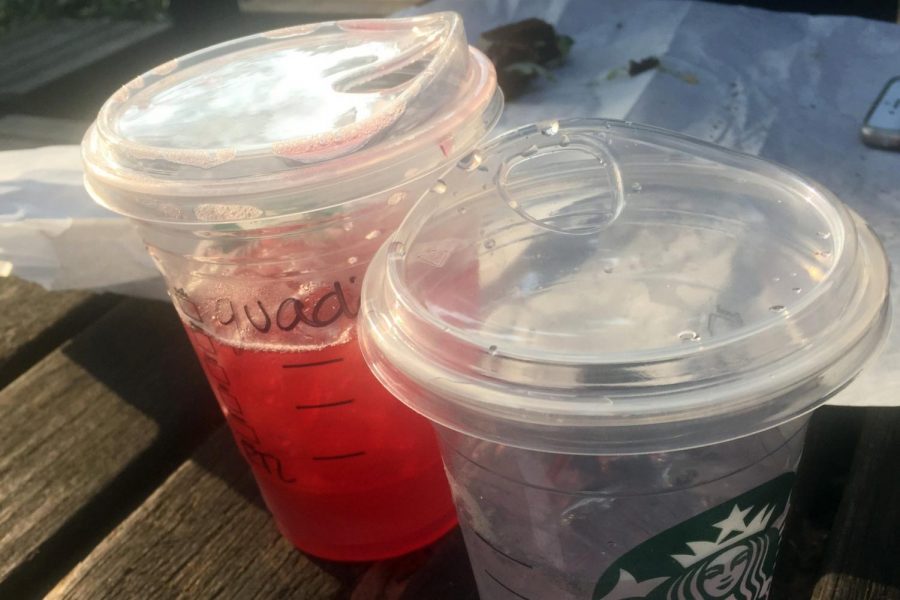Plastic straws among other disposables banned at Sac State
CSU sustainability policy aims to reduce waste on campuses
Will Coburn – The State Hornet
A pair of Starbucks cups with “Nitro” lids on a table outside the Riverfront Courtyard. The “sippy cup” style of lid is being used to replace straws on most Starbucks cold beverages below Trenta size.
January 31, 2019
Sacramento State has banned eateries from offering plastic straws and single-use plastic carryout bags as of Jan. 1.
The decision was made in an effort to decrease the campus’ use of disposable trash in compliance with CSU’s sustainability goals, which went into effect Dec. 17, 2018.
“Sac State is working to comply with the CSU and the Chancellor’s office to increase awareness and limit the amount of disposable items that contribute to the landfills,” said Angela Rader, University Enterprises, Inc.’s marketing director. “All dining concepts have been directed to follow this guidance.”
Several of the dining options around campus started implementing the straw ban as early as last fall.
The Courtyard Market substituted plastic straws with paper straws last semester. Baja Fresh Express has replaced their plastic take-out bags in favor of brown paper bags.
Starbucks has also started using a wide-mouth “sippy cup” lid called the “Nitro” lid after the cold brew drinks they were introduced for.
“Starbucks, the main corporate stores, are talking about getting rid of them [straws] anyway, so, we started last semester which is why we started using the “Nitro” lids,” said Rebecca Randolph, a supervisor at Starbucks.
Starbucks is only one of several companies that are actively seeking a solution to replace plastic straws, according to Rader. Other dining locations have been instructed to replace the single-use plastic straws with material that is recyclable or less harmful to the environment.

“Straws made of paper or PLA, a recyclable and/or compostable material are among the options,” said Rader.
PLA, or polylactic acid, is a biodegradable thermoplastic that is made from renewable resources.
Stephanie Port, a history major, received one of the last remaining plastic straws from the Starbucks in the Riverfront Center, but said she was OK with getting rid of the straws.
“I don’t like it when plastic winds up in the ocean,” Port said. “I like how in the store by the dorms they give you the paper ones, I’d consider buying a metal one though.”
Biomedical sciences major Eleyna Guerrero had one of the “Nitro” lids and expressed some cynicism.
“They have to use more plastic to make a thicker lid,” Guerrero said. “Maybe if they sold reusable straws at a reasonable price, but not $6, like is Starbucks just trying to get money?”
In addition to the straw and plastic carryout bag bans, CSU policy has also implemented other long-term goals to be completed no later than 2023.
Vendors at any CSU will no longer carry any food service items made of polystyrene, more commonly known as styrofoam, by Jan. 1, 2021.
The elimination of plastic water bottles is planned by Jan. 1, 2023. A 25 percent reduction of purchased and sold water bottles will take place each year.
According to the policy, exceptions to the newly implemented bans can only be made to comply with the Americans with Disabilities Act requirements or when it is shown that “undue hardships” are being placed on students or organizations when complying to these rules.
Robyn Dobson contributed to this report.
































































































































